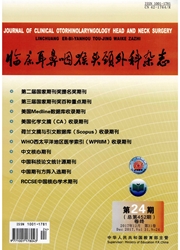

 中文摘要:
中文摘要:
目的:总结成人不同致聋病因人工耳蜗植入术前后注意事项,探讨各种病因对术后听力、言语能力康复的影响。方法:接受人工耳蜗植入手术,并开机、复诊的患者30例,共涉及12种致聋病因,使用《Nijmegen人工耳蜗植入量表》,在每例患者佩戴人工耳蜗1年时进行问卷随访,并测试其助听听阈。按病因顺序,汇总每例患者量表中6个侧面问题的平均分,声场测试各频率听阈及平均听阈。结果:所有患者的平均助听听阈均好于35dBHL;28例患者在基本声音感知、高级声音感知及自信心方面平均得分≥75分;26例活动能力平均得分≥75分;22例在社交能力和言语能力方面平均得分≥75分。结论:符合植入手术指征的不同致聋病因成人患者,植入后听觉感知能力都得到大幅提高,手术前后需要对原发病因加以控制;各类致聋原因对患者言语能力康复的影响,取决于耳聋发生时语言中枢的发育状况;各类病因成人患者使用人工耳蜗后能够增强自信心和社会认同感,后天致聋患者表现尤为显著。
 英文摘要:
英文摘要:
This article summarizes the matters warranting consideration in adult cochlear implants before and after operation with different deafness causes and investigates the impact of etiological variables that af- fect hearing and speech ability rehabilitation after cochlear implantation. Method: We retrospectively reviewed the preoperative data of 30 adults who have received cochlear implantation, switch on, and periodical post operative mapping. 'Nijmegen Cochlear Implant Questionnaire' was used for every patient during follow-up and test their hearing thresholds at one year after switched-on. The average score of every patient in the six aspects of question- naire, along with the average hearing threshold, has been gathered. Result: The average hearing threshold of every patient is lower than 35 dBHL. The average score of 28 Patients is more than or equal to 75 in the basic sound perception, advanced sound perception as well as self-esteem. The average score of 26 patients is more than or e- qual to 75 in capacity for action. Besides, as for sociability and speech ability, the average score of 22 patients is more than or equal to 75. Conclusion:Auditory perception can be greatly improved regardless of deafness causes, on the premise that appropriate candidate is selected. The primary disease should be brought under control before and after the operation. The influence of various causes to the language ability rehabilitation largely depends on the development of the language center at deafness onset. Self-esteem and social identity can be significantly enhanced after cochlear implantation in adult patients, particularly those with acquired deafness.
 同期刊论文项目
同期刊论文项目
 同项目期刊论文
同项目期刊论文
 期刊信息
期刊信息
